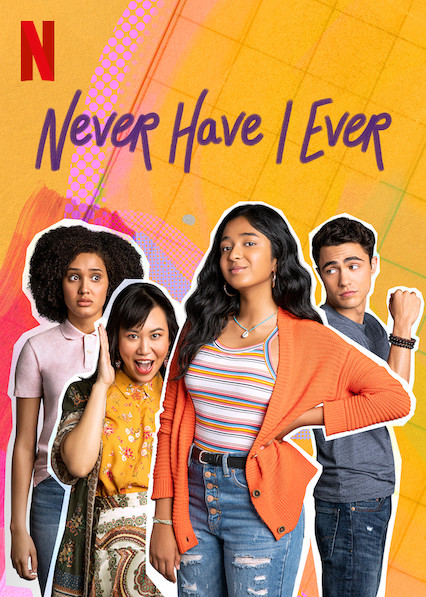Never Have I Ever (S1)
I’ve been a fan of Mindy Kaling ever since she appeared on one of my all-time favorite shows, The Office. For me, she’s the epitome of brown girl representation in the realm of mainstream Western entertainment. So naturally when she came up with a series that was going to showcase a curry teenage girl’s struggles, I was stoked.
This coming-of-age dramedy follows the complicated life of a modern-day first generation Indian-American teenager as she navigates her sophomore year of high school. It is inspired by Mindy’s own life. The main lead is shown coping with the death of her father by pursuing an attractive white boyfriend, to improve her social status among her peers. She is an overachieving student who has a short fuse that gets her into difficult situations. It has several breakout performances, most notably by the main character Devi (played by the debutante Maitreyi Ramakrishnan), her mother (Poorna Jagannathan), father (Sendhil Ramamurthy), cousin Kamala (Richa Moorjani) and of course, the cherry on the cake for me…the ever so hot combination of brain and brawn, Rushi Kota (man has been to Harvard!). Well I’m definitely partial towards him, and why ever not? He’s perfect eye-candy, even though he has a minuscule role. The chemistry between Devi and both her besties (played by Lee Rodriguez and Ramona Young) is a treat to watch. Devi’s crush Paxton (played by Darren Barnet), and her classmate Ben (Jaren Lewison) add gumption to the storytelling with their performances.
In Hollywood, South Asian characters are often typecast a certain way, with a set of stereotypes and tropes that can be expected to play out no matter the context, a formula is usually followed – either a minority character is portrayed resenting and struggling with their ethnic background, or they have absolutely no problem understanding the intricacies of their culture. There is no realistic middle ground, the way it should be.
Never have I ever however embraces the fact that true minority experience isn’t simply good or bad – it’s complicated. The nuances in Devi’s relationship with her heritage are highlighted very well. For many young girls hailing from our subcontinent, watching her on the show would probably be the very first time that they feel truly seen in the world. Devi doesn’t dislike her culture; she just doesn’t necessarily understand where she fits in. That’s such a common story with many folks from many cultures, not just the curry culture. And this is one of the main reasons why the show garnered so much attention and popularity so quickly.
Having said all this, let’s focus on some of the problematic areas. It is not authentic desi-diaspora representation in its entirety and that has made me reflect. The show while attempting to center Indian-American girlhood and address colorism, has somehow normalized purity culture and racial supremacy in what it presents as a relatable experience of “brownness”. It also has disturbing elements of fat-shaming, casteism, ableism etc., which concerned me as I was watching it. The people of color in the sow are shown to be in a cultural void and have little texture. By vying to look diverse, the show seems to think that it’s various clichés and weak plots are above reproach. Mindy and her team of writers could’ve done far better; there definitely is room for improvement.
Hoping that the new season fixes at least some of these issues. All said and done…with its talented coterie of actors who managed to bring life to each character, this path-breaking and ‘non-whitewashed’ show with its brown representation, varied sub-plots and relatable hilarious quips is highly recommended! Devi as a human being, who isn’t just defined by her culture but is funny, annoying and a mess needs to be experienced. I enjoyed the trailer, and am super excited to binge-watch the second season of this fun, happening and relaxing series that premieres on 15th July on Netflix. What about all of you?
Disclaimer: The above review solely illustrates the views of the writer.




